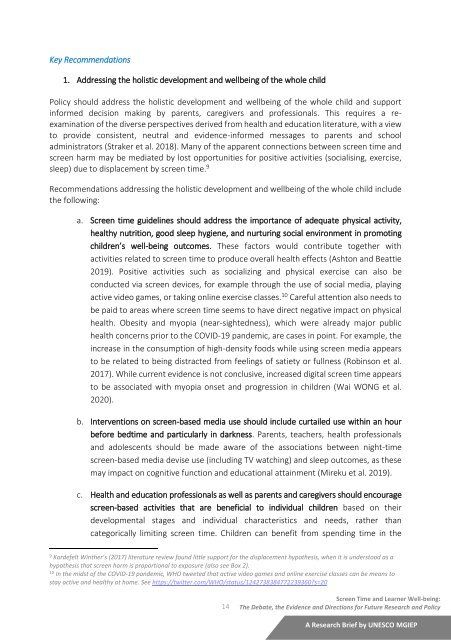Screen Time and Learner Well-being
The Debate, the Evidence and Directions for Future
The Debate, the Evidence and Directions for Future
Create successful ePaper yourself
Turn your PDF publications into a flip-book with our unique Google optimized e-Paper software.
Key Recommendations<br />
1. Addressing the holistic development <strong>and</strong> well<strong>being</strong> of the whole child<br />
Policy should address the holistic development <strong>and</strong> well<strong>being</strong> of the whole child <strong>and</strong> support<br />
informed decision making by parents, caregivers <strong>and</strong> professionals. This requires a reexamination<br />
of the diverse perspectives derived from health <strong>and</strong> education literature, with a view<br />
to provide consistent, neutral <strong>and</strong> evidence-informed messages to parents <strong>and</strong> school<br />
administrators (Straker et al. 2018). Many of the apparent connections between screen time <strong>and</strong><br />
screen harm may be mediated by lost opportunities for positive activities (socialising, exercise,<br />
sleep) due to displacement by screen time. 9<br />
Recommendations addressing the holistic development <strong>and</strong> well<strong>being</strong> of the whole child include<br />
the following:<br />
a. <strong>Screen</strong> time guidelines should address the importance of adequate physical activity,<br />
healthy nutrition, good sleep hygiene, <strong>and</strong> nurturing social environment in promoting<br />
children’s well-<strong>being</strong> outcomes. These factors would contribute together with<br />
activities related to screen time to produce overall health effects (Ashton <strong>and</strong> Beattie<br />
2019). Positive activities such as socializing <strong>and</strong> physical exercise can also be<br />
conducted via screen devices, for example through the use of social media, playing<br />
active video games, or taking online exercise classes. 10 Careful attention also needs to<br />
be paid to areas where screen time seems to have direct negative impact on physical<br />
health. Obesity <strong>and</strong> myopia (near-sightedness), which were already major public<br />
health concerns prior to the COVID-19 p<strong>and</strong>emic, are cases in point. For example, the<br />
increase in the consumption of high-density foods while using screen media appears<br />
to be related to <strong>being</strong> distracted from feelings of satiety or fullness (Robinson et al.<br />
2017). While current evidence is not conclusive, increased digital screen time appears<br />
to be associated with myopia onset <strong>and</strong> progression in children (Wai WONG et al.<br />
2020).<br />
b. Interventions on screen-based media use should include curtailed use within an hour<br />
before bedtime <strong>and</strong> particularly in darkness. Parents, teachers, health professionals<br />
<strong>and</strong> adolescents should be made aware of the associations between night-time<br />
screen-based media devise use (including TV watching) <strong>and</strong> sleep outcomes, as these<br />
may impact on cognitive function <strong>and</strong> educational attainment (Mireku et al. 2019).<br />
c. Health <strong>and</strong> education professionals as well as parents <strong>and</strong> caregivers should encourage<br />
screen-based activities that are beneficial to individual children based on their<br />
developmental stages <strong>and</strong> individual characteristics <strong>and</strong> needs, rather than<br />
categorically limiting screen time. Children can benefit from spending time in the<br />
9<br />
Kardefelt Winther’s (2017) literature review found little support for the displacement hypothesis, when it is understood as a<br />
hypothesis that screen harm is proportional to exposure (also see Box 2).<br />
10<br />
In the midst of the COVID-19 p<strong>and</strong>emic, WHO tweeted that active video games <strong>and</strong> online exercise classes can be means to<br />
stay active <strong>and</strong> healthy at home. See https://twitter.com/WHO/status/1242738384772239360?s=20<br />
14<br />
<strong>Screen</strong> <strong>Time</strong> <strong>and</strong> <strong>Learner</strong> <strong>Well</strong>-<strong>being</strong>:<br />
The Debate, the Evidence <strong>and</strong> Directions for Future Research <strong>and</strong> Policy<br />
A Research Brief by UNESCO MGIEP

















